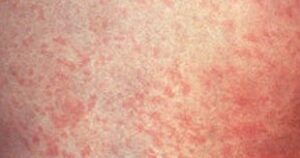Rubella
Rubella
Rubella is a viral infection that is highly contagious and characterized by it’s distinctive red rashes. Rubella is also known as German measles or three-day measles. It can lead to cause serious problems for unborn babies, whoes mothers become infected during pregnancy. However, to effectively prevent rubella a vaccine, measles-mumps-rubella (MMR) vaccine, is given.
Symptoms
Symptoms appear between 2 to 3 weeks after exposure to causative agent,
and last about 1 to five days. Some signs and symptoms are:
- Low grade fever
- Intense headache
- Runny or stuffy nose
- Red and inflammed eyes
- Tender and enlarged lymph nodes
- Pink, fine rash appear on the face and the spreads to trunk and then the arms and legs. Rahses then disappears in the same sequence.
Causes
This infection is caused by virus that is transmitted from person toto person through cough and sneezing. It can also by transmitted through direct contact with the infected person’s secretions like mucus. To the fetus, it can be passed from infected pregnant women via bloodstream.
Complications
- Arthritis in women
- Ear infection
- Encephalitis
- If pregnant women had rubella it can cause congenital rubella syndrome to the infant born. This syndrome include problems like delayed growth, cataract, deafness, intellectual disabilities.
Diagnosis
Diagnosis of rubella depends upon detailed medical history and complete general physical examination of the patient and examination for rashes. Other tests include: virus culture and blood tests.
Treatment
- Usually there’s no treatment for rubella and it’s self-limiting
- Isolation of the infected person is recommended especially from pregnant women.
- Hyperimmune globulin can be given to pregnant women who have got the infection. This will fight off the infection and reduce the symptoms, but will not completely eliminate the possibility of baby having congenital rubella syndrome
